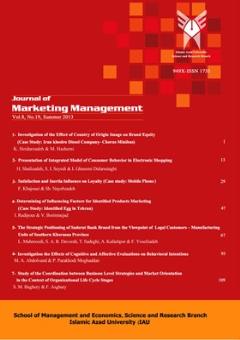Designing and explaining the model of consumer personality traits based on the impulse buying approach in international market with a mixed method
Subject Areas : Jounal of Marketing Management
Rahele Ansari
1
![]() ,
Seyyed Hassan Hatami-nasab
2
,
Seyyed Hassan Hatami-nasab
2
![]() ,
Shahnaz Nayebzadeh
3
,
Shahnaz Nayebzadeh
3
1 - PhD student, Department of Management, Yazd Branch, Islamic Azad University, Yazd, Iran
2 - Department of Management, Yazd Branch, Islamic Azad University, Yazd, Iran
3 - Professor of Marketing, Department of Management, Yazd Branch, Islamic Azad University, Yazd, Iran
Keywords: Impulsive buying, consumer, personality traits, international markets, mixed approach.,
Abstract :
Introduction: This research was conducted with the aim of designing and explaining the model of consumer personality traits based on the impulse buying approach. Research design/methodology/approach: The methodology of the current research was descriptive-exploratory with a mixed approach (sequential type, qualitative-quantitative). The steps include: conducting interviews with women with impulse buying experience and data analysis using the theme analysis method to form the model and then testing and validating the model to identify the final pattern. The participants of the research in the qualitative part were the women of 2 neighboring countries of the Persian Gulf along with 2 southern provinces of Iran, whose impulsiveness in using cosmetics was proven by using RFM and Barratt (1994) tests. In the quantitative part, the statistical population includes all women who use a lot of cosmetics in 3 countries on the edge of the Persian Gulf and women in the southern provinces of Iran. Also, the qualitative analysis of the data obtained from the interviews in the upcoming research was done using the theme analysis method and quantitative data analysis using SPSS and SmartPLS 3 software and at a significance level of 5%. Findings: The findings showed that the research conceptual model includes the variables: feeling the need to buy, tendency to buy impulsively, impulsive buying behavior, consequences, memorization and shopping saturation that this model was tested in the quantitative section and the findings showed at the 95% confidence level, except for one path, all the paths of the model are approved and meaningful.
. Yoon, S. O., Suk, K., Lee, S. M., & Park, E. Y. (2010). To seek variety or uniformity: The role of culture in consumers’ choice in a group setting. Marketing Letters, 22(1), 49–64.
2. Zhang, K. Z. K., Xu, H., Zhao, S., & Yu, Y. (2018). Online reviews and impulse buying behavior: the role of browsing and impulsiveness. Internet Research, 28(3), 522–543.
3.Cakanlar, A., & Nguyen, T. (2019). The influence of culture on impulse buying. Journal of Consumer Marketing, 36(1), 12–23.
4. Morin, M. and Chebat, J.C. (2005), “Person-place congruency: the interactive effects of shopper style and atmospherics on consumer expenditure”, Journal of Service Research, Vol. 8 No. 2, pp. 181-191.
5. Youn, S., & Faber, R.J.(2000). Impulse buying: Its relation to personality traits and cues, Advances in Consumer Research, 27, 17.
6. Verhagen, T., & Van Dolen, W. (2018). The influence of online store beliefs on consumer online impulse buying: A model and empirical application. Information & Management, 48(8), 320–327.
7. Beatty, S.E. ,Ferrell, M.E. (1998) Impulse buying: modeling its precursors. Journal of Retailing, 74(2), 169–91.
8. Huang, L. T. (2015). Flow and social capital theory in online impulse buying. Journal of Business Research, 69(6), 2277–2283.
9. Verplanken, B., & Herabadi, A. (2001). Individual differences in impulse buying tendency: feeling and no thinking. European Journal of Personality, 15(1_suppl), S71–S83.
10. Asendorpf, J. B. (2003). Head-to-head comparison of the predictive validity of personality types and dimensions. European Journal of Personality, 17, 327–346.
11. Aydin, S., Ceylan, H. H., & Aydin, E. (2014). A research on reference behavior trend according to Horney’s personality types. Procedia - Social and Behavioral Sciences, 148, 680 - 685.
12. Salman, M., Khan, S., & Aly Gul, M. S. (2014). Factors Influencing Impulse Buying of Sports Team Merchandise in Developing Country: an Empirical Investigation.Pakistan Journal of Commerce & Social Sciences, 8(1).
13. Foroughi, A., Buang, N. A., Senik, Z. C., Hajmirsadeghi, R. S., & Bagheri, M. M. (2014). The Causes of Impulse Buying Behavior among Iranian Shoppers. Journal of Basic and Applied Scientific Research, 10(21), 760–769.
14. Rouhollahi, Mahdi., Khanipour, Seyed Sajjad., Bagheri, mahnaz., Mousavi Davoudi, Seyed Mehdi. (2020). Investigating the Role of Personality Characteristics and Psychological Health on Organizational Citizenship Behavior in Mazandaran Technical and Vocational Training Organization, Quartely Journal of Karafan. 17 (3). 61-77.
15. Wang, X., Tauni, M. Z., Zhang, Q., Ali, A., & Ali, F. (2020). Does buyer-seller personality match enhance impulsive buying? A green marketing context. Journal of Marketing Theory and Practice, 28(4), 436–446.
16. Thompson, E. R., & Prendergast, G. P. (2015). The influence of trait affect and the five-factor personality model on impulse buying. Personality and Individual Differences, 76, 216–221.
17. Nayebzadeh, S., & Jalaly, M. (2014). Investigating Iranian female Muslim consumer impulse buying behaviour used as a form of retail therapy. Journal of Islamic Marketing, 5(2), 302–320.
18. سالاری، سیده زهرا؛ محمودی، ادریس؛ نداف، مهدی،(1395)، بررسی رابطه ی ویژگیهای شخصیتی با خرید تکانشی و رفتار خرید تنوع طلبانه مورد مطالعه: مصرف کنندگان محصولات آرایشی و بهداشتی در شهر اهواز، کنفرانس بین المللی رویکردهای نوین در انسانیت در قرن بیست و یکم.
19. Barratt, E. S. (1994). Impulsiveness and aggression. In J. Monahan & H. J. Steadman (Eds.), Violence and mental disorder: Developments in risk assessment (pp. 61–79).
20. اختياري، حامد؛ رضوان فرد، مهرناز و مكري، آذرخش. (1387). تكانشگري و ابزارهاي گوناگون ارزيابي آن: بازبيني ديدگاه ها و بررسي هاي انجا م شده، مجله روانپزشكي و روانشناسي باليني ايران، 3 (14)،247-257.
21. Nunnally, J.C. (1978), "Psychometric Theory", 2nd ed., McGraw-Hill, New York, NY.
22.Ling, K. C., Chai, L. T., & Piew, T. H. (2018). The effects of shopping orientations, online trust and prior online purchase experience toward customers’ online purchase intention. International Business Research, 3(3), 63-76.


